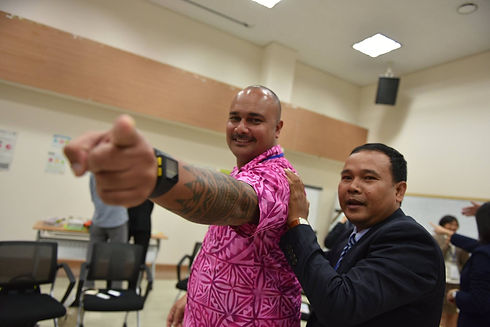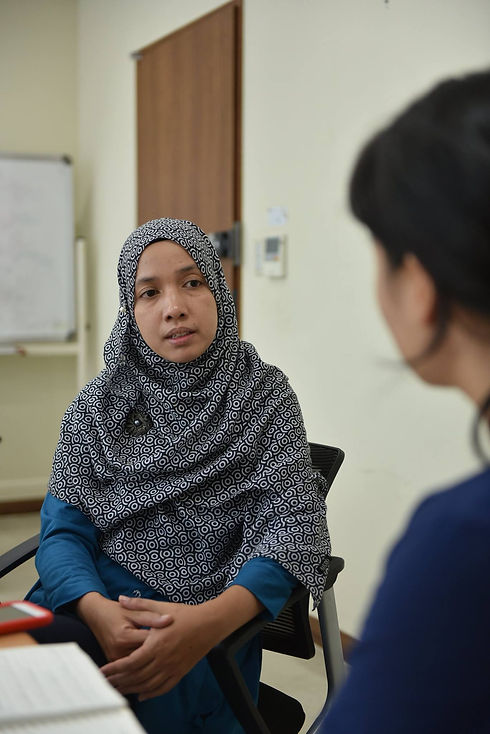
AICHE BA
"There are many challenges the education system faces. Teachers are always struggling to improve their work and living conditions. Teachers are not as well paid comparing to teachers from neighboring countries.
Another conflict for education comes from my culture. Some parents believe it is not necessary to send girls to school, especially for higher levels of education. For them, girls must get married and have children in order to avoid the poverty their parents live in. A father will give up his daughter to marriage thinking that his in-laws will help solve his financial problems. Early marriages are a barrier for girls from benefiting the rights of education."
AICHE BA
"In Mali, we women must fight for our rights. Unfortunately, tradition and religion can be a barrier for women to achieve equal rights. We must fight for improvements for our work and living conditions. We have the same competence as a man, so why should we not have the same opportunities as a man?
Equality has not been achieved yet. There has been much progress since many women can apply for political positions and can run to become president of our country. Still, there are challenges. For example, some people are not willing to hire a woman. These people assume because she is a woman, she will become pregnant and miss work. They assume a woman cannot be a competent employee while taking care of her family. This is a problem. Pregnancy is not wrong, so why not hire a woman?"


MEHRAK RAHIMI
“Sometimes, students cannot come to school for money problems. Some parents cannot afford the fees. There is a part of my city where there are students who live far away from school. To get to school, they have to go through rough conditions, such as crossing the river. There are bridges at times, but it is not in good condition. In the city, like Jakarta, there are lots of street children. Teachers have to force students to go to their school. Their family tells the child that they must focus on surviving that present day rather than focus on their education. To survive, children must assist their family with food and money. They are probably forced to become a beggar due to the request of their parents. And there are students at night who have to work. So during school, they get sleepy. The age ranges from primary school to 12 years old. They do many different types of work, such as selling newspapers, cleaning shoes, and selling something on the street.”
MEHRAK RAHIMI
“The biggest reason why parents do not send their children to school is because they need help from their children to earn money. That is it. As parents, they still love their child. But probably due their money status, they have to live this way of life. If the children are still in primary school, they probably send them to school. But, when children get older, sometimes the children themselves don’t want to go back to school. They have the freedom to do what they want. They think it is better to be on the streets rather than do their homework or wake up early for school.”


DELANEY YAQONA
“Your knowledge is such that you are not confined to a particular area. Wherever you are, you know a bit about the world. But it goes beyond that. It is not just about knowledge. It is about knowing your place in the larger world and knowing how you can contribute to that larger world. Some people might just say, “But, I am just a little person here in Korea. How can I affect change in the whole world?” We have to understand it is not about affecting change in the whole world. It starts with the individual. You make the change. You influence someone else. They influence the next person. And that grows.”
DELANEY YAQONA
“I think one of the keys to global citizenship is not to expect change right now. It is transformative change and it takes time. You have to have patience to allow that change to happen. It may be fast or slow, but you got to allow it to happen. Now that is what citizenship is all about. It is about finding your place in life and deciding how you can affect change. The smallest changes will grow. Eventually, regardless of how long it will take, the world will be a peaceful place where we can all coexists. In my journey, did I make a positive change in at least one person? Did I make changes for that person’s life? I’d like to think along the way, my students had positive change because of something that I did. Those are the little things I am talking about.”


SELVARANEE ILLANCO
“People in the Northeastern part in Sri Lanka are marginalized. Because of the war, children cannot go to schools. Most people went abroad to get an education. Most parents cannot send their children to school because they won’t know what will happen. The learning environment is not there. The education there is not very good. Ethnic violence and discrimination halts children from receiving their education. The other barrier is misunderstanding. Both of the parties do not know each other’s language. Sinhalese people and northeastern people have their own language. But the central people can speak both, so they don’t have any language problem. These two can have misunderstandings because they don’t understand each other. So, there is no social harmony.”
SELVARANEE ILLANCO
“The most important thing to remember when trying to be a good teacher is the deliverance. Many teachers do not understand what a diverse student is. They believe it is special needs. Special needs are a totally different type of student. Diverse students are students with individual needs. We have to combine the student’s different interests and learning styles. The teachers must understand each student because everyone is different. They must ask themselves what the different interests and learning style is of each child.”


MUKHHTAR ALAM
“Global warming is a global issue. Whether the country is causing global warming or not, we are going to suffer from it. Until very recently, there were people who did not believe that global warming was taking place. Now, there is a consensus that the globe is warming up and that it will cause a lot of problems. There is a guy who stated, “My country now has a sell by date, which means that the country has a date that says it will no longer exist.” It is an island country. These people in this island are looking for a place and New Zealand is the only place willing to accommodate those people. Because of climate change, the island will submerge.”
MUKHHTAR ALAM
“In Pakistan, we have this problem of extremist thinking. We do not have enough tolerance which creates problems for students. You may have heard about a certain group of people who are destroying schools for girls. So, this kind of situation becomes a problem for girls who want to go to school. A certain group was destroying schools that were for girls only. In other cases, I have seen situations where boys are sent to better schools, and girls are sent to no costing schools or no school at all. That kind of situation exists in Pakistan. There are quite a lot of people who do not follow it, but there are some who do. If you look at the top positions in Pakistan, girls take the first 2-3 positions. So, the girls are doing very well when they have the chance. It is perhaps because they feel responsible. When their parents give them an opportunity that is not available for all, the girls feel more responsible for that opportunity. The parents or family have taken an extra step to educate these girls. So, these girls feel responsible.”


MUKHHTAR ALAM
“I am familiar with that kind of conflict and situation. It can be for religion, money, or other reasons. I cannot say I understand it, but I know about it and I have information. For example, there is one group that is fighting to gain money. There is another group that is fighting for justice. There is another group that is purely crooks and criminals. There is another group that is inspired by religious thinking. That itself is a different question as to what religion tells you. But, they are similar in the sense that they have to pick up the gun and they have to go out and fight. While others are saying that you don’t have to pick up the gun, you have to pick up the pen. There are others who say it is okay that I follow my religion while you follow yours. The pen is of course more powerful. The gun is more powerful in the short term. But the pen has a more lasting and enduring effect because the pen appeals to the mind. A gun threatens the body. A message of pen lasts for thousands of years. A message of the gun is only momentarily.”
ULI RATNA MULIAWATI
“We have to provide young people with facts. We have to show them real consequences of what humans have done to the world. If they can see, then they can better relate to the issues that are harder to relate to. People should be attentive to local issues. This links back to global issues. We have to make them realize that this is what is happening to our country. This is what is happening to our human resources and natural resources. Maybe we can have field trips so that they can actually see it for themselves. Yesterday we had a forest here, today there is no sign of the forest because we have consumed and cut down the trees. So we have to see and be observant of the environment. They should feel personally, locally, nationally, and then internationally affected by it.”


ULI RATNA MULIAWATI
“Being a global citizen, you have your own values and identity while at the same time you respect everyone. My message would be that all of us are human regardless of the language, religion, and differences we have. Let’s understand each other and focus on those qualifications that have made us human. There should be a difference between humans and animals.”
ULI RATNA MULIAWATI
"Education is one of the most important things that everyone needs. Education spreads self-awareness. Many things happen in the world because people are ignorant of facts. They don’t have information. So, education makes people more alert and aware of other people’s situation. Education makes a global problem a local problem."

